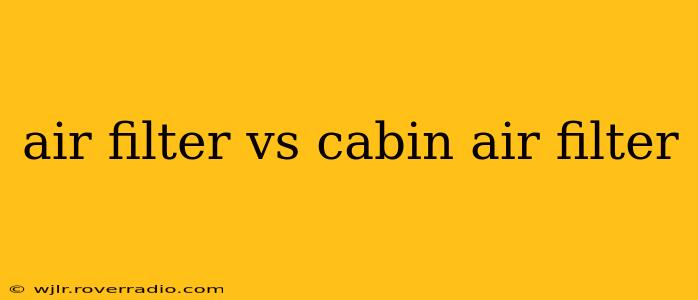Choosing the right filter for your vehicle can seem confusing, especially when faced with terms like "air filter" and "cabin air filter." While both are crucial for maintaining your car's health and your comfort, they serve distinctly different purposes. This guide will clarify the differences, helping you understand when each needs replacing and why regular maintenance is vital.
What is an Air Filter?
The air filter is located within the engine compartment, usually near the engine itself. Its primary role is to protect the engine's internal components from dirt, dust, pollen, and other debris present in the outside air. Clean air is essential for optimal engine performance and longevity. A clogged air filter restricts airflow, leading to reduced fuel efficiency, decreased engine power, and potentially even engine damage over time. Think of it as the engine's respiratory system – keeping it clean ensures it breathes properly.
How Often Should I Replace My Air Filter?
The recommended replacement interval for your air filter varies depending on your vehicle's make and model, as well as your driving conditions. Consult your owner's manual for specific recommendations. Generally, it's advisable to replace it every 12,000 to 15,000 miles, or more frequently if you often drive in dusty or dirty environments. Visually inspecting the filter regularly can also help determine when a replacement is needed. A noticeably dirty or clogged filter should be replaced immediately.
What is a Cabin Air Filter?
The cabin air filter, also known as the pollen filter or interior air filter, is situated within the vehicle's ventilation system. Its job is to filter the air that enters the cabin, keeping out dust, pollen, allergens, and other airborne contaminants. This improves the air quality inside your car, creating a more comfortable and healthier environment for you and your passengers, especially for those with allergies or respiratory sensitivities.
How Often Should I Replace My Cabin Air Filter?
Like the engine air filter, the recommended replacement frequency for the cabin air filter depends on several factors, including driving conditions and personal preferences. Most manufacturers suggest replacement every 12,000 to 20,000 miles. However, if you frequently encounter dusty or polluted conditions, or if you suffer from allergies, more frequent replacements are advisable – perhaps every 6-12 months. A musty smell from the vents is often a clear indication it needs changing.
What Happens if I Don't Replace My Air Filters?
Neglecting air filter replacements can lead to several negative consequences:
- Reduced Engine Performance (Engine Air Filter): A clogged engine air filter restricts airflow, leading to decreased power, lower fuel efficiency, and potential engine damage.
- Increased Fuel Consumption (Engine Air Filter): The engine has to work harder to compensate for restricted airflow, resulting in higher fuel consumption.
- Poor Air Quality (Cabin Air Filter): A dirty cabin air filter allows allergens, dust, and pollutants to enter the cabin, leading to discomfort, allergies, and respiratory issues for occupants.
- Musty Odors (Cabin Air Filter): A clogged cabin air filter can trap moisture and promote the growth of mold and mildew, resulting in unpleasant odors.
How are Air Filters and Cabin Air Filters Different?
The key differences are summarized in this table:
| Feature | Engine Air Filter | Cabin Air Filter |
|---|---|---|
| Location | Engine compartment | Vehicle's ventilation system |
| Purpose | Protects engine from outside debris | Filters air entering the passenger cabin |
| Impact | Engine performance, fuel efficiency | Air quality inside the vehicle |
| Replacement | Every 12,000-15,000 miles (approx.) | Every 12,000-20,000 miles (approx.) |
Regular maintenance of both your engine air filter and cabin air filter is crucial for ensuring optimal vehicle performance and a healthy, comfortable driving experience. Remember to consult your owner's manual for specific recommendations tailored to your vehicle.
